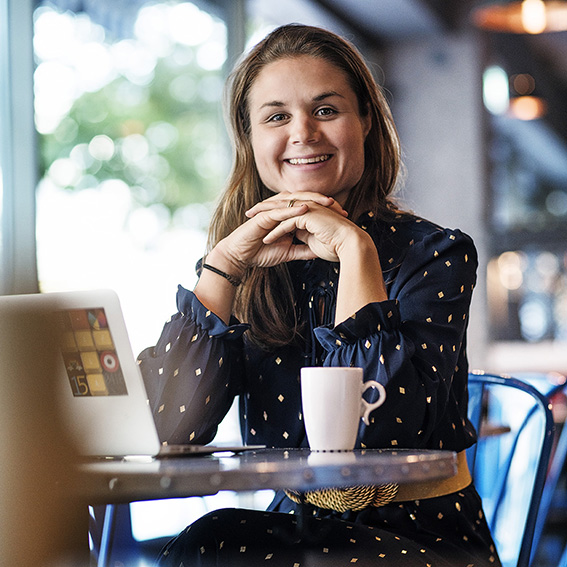Paulina Modlitba is the Alum of the Year 2018
Paulina Modlitba does not shy away from tackling tough challenges. She’s gone from startups in the gaming industry to becoming the government’s digitalisation expert and today she runs her own successful business. The times she has been back at KTH for guest lectures has shown her what difference she and other alumni can make to current students.
"I see this award as a way to be involved and contribute to what I felt I needed and that was somewhat lacking when I was a student.”

- It was love at first sight.
Paulina Modlitba studied media technology in 2001-2006 and fell head over heels in love. It is a love she now wants others to be able to experience.
It was not a given that she would start at KTH. Although she always possessed a keen technical interest, KTH was not an option. KTH students were, for her, young men in silly overalls who sold magazines at central station. Paulina was a bookworm who dreamed of becoming a journalist, designer or psychologist, but who started at Stockholm School of Economics.
"On the first day at Stockholm School of Economics, the principal asked us freshers to come up to his room for a welcome in person. He asked us to give three reasons why we wanted to study there. When it was my turn, I had nothing to say.
Paulina left Stockholm School of Economics and started reading ethnology. Whilst doing this, she received a tip from a friend about a new course at KTH, a Master of Science in Media Technology. This degree gave her the interdisciplinary approach she had always been looking for. According to Paulina, Media Technology has created many opportunities, and therefore it feels important and natural to give something back in return.
During her studies, Paulina missed having connections with alumni. Her tutor said she could become what she wanted, but she just did not know what. Therefore, it feels great to come back to KTH and help students to decide how to move forward. The times she has been to KTH for guest lectures, she has received confirmation that she makes a difference for the students.
"I see this award as a way to be involved and contribute to what I felt I needed and that was somewhat lacking when I was a student.”
Paulina explains that it is, of course, good that academia stands up for a non-commercial perspective and that education and research continue to nurture and further development outside the world of business.
"But academia is enriched by finding another form of education as a module course and focus on closer contact with the business sector.
She believes that today it is no longer always preferable to study for a profession, rather it is necessary to build one’s career on skills.
"Today, employers are looking for the right personality and knowledge," says Paulina.
Digitalisation widens social gaps
Paulina was recently a part of the Digitalisation Commission’s Expert Group. She states that we have a romantic picture of digitization and that it is naive to believe that actors online would be driven by kindness and benevolence. In addition, there is a risk that digital platforms create knowledge gaps.
"The socio-economically disadvantaged groups face unemployment and exclusion, while we who have the skills prepare for the future.
The digital elite pull away and those who do not keep up lose ground every day.
- AI will change everything! I do not understand that it's not an election question. We will have to completely rethink the way we act.
Paulina believes that we place too much faith in the Swedish model that society will take care of us. Society will not be able to ensure that all citizens have employment when algorithms take over simpler jobs.
"We will need to introduce a basic income for those who have not been able to obtain higher education.
She runs her own company as a consultant and digitization strategist.
"As a woman, I have noticed the opportunity to go all the way is sometimes lacking. I had the drive and ambition to participate in the management team and become a partner in the startup companies I worked in, but I soon noticed that I was not let in.
So she started her own company. It was originally intended as a transitional solution, but as her career took off, she has been able to continue.
- I see a clear trend in that most of the women I know are starting their own businesses. That is probably what is required to get our careers to really take off.
Text: Sofia Tatsis
